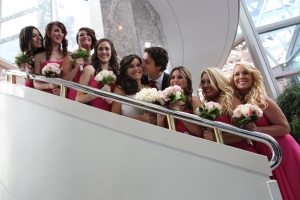A Russian-flagged vessel played a key role in Canada's recent discovery of a sunken ship from the missing Franklin expedition, a scenario that faced a regulatory challenge and gave senior Conservative officials pause.
Prime Minister Stephen Harper has billed the Franklin search as an expression of Canadian sovereignty in the North — particularly in light of the "imperial ambitions" of Russian President Vladimir Putin.
The mapping and surveying activities that are part of the search are also considered a sign of domestic prowess in the Arctic.
A Russian-owned ship became part of the multi-partner Victoria Strait Expedition after it became apparent that the Canadian alternative, a former coast guard icebreaker, couldn't carry the private financial donors underwriting part of the search.
B.C.-based One Ocean operated ship
The Akademik Sergey Vavilov, crewed by the Russian Academy of Sciences, was chartered and operated by British Columbia-based One Ocean Expeditions. The firm regularly uses Russian-flagged ships to run its tours into the Arctic.
The Royal Canadian Geographical Society helped put together a team that included One Ocean and other corporate sponsors to partner with the federal government in its search for the Franklin ships, lost in the Arctic around 1845. The Akademik Sergey Vavilov was to serve as a platform for the federal government's state-of-the-art underwater survey vehicle.
By offering donors a chance to ride along, the non-profit geographical society was able to help pay for the expensive charter and also fund a range of educational work across the country.
But when the details of the search partnership emerged, not everyone celebrated the arrangement.
Calgary-based GX Technology, which owns the ship Polar Prince, objected to the use of the Russian-flagged vessel and to the fact that the Canadian Transportation Agency had certified the temporary importation of the foreign ship.
Ray Pierce, an arctic operations expert with GX and formerly of the Canadian Coast Guard, was critical of how the expedition itself was put together.
In the context of a multi-million search for the sunken Franklin ships, using the Polar Prince would not have made a significant budgetary difference, he argued. The Polar Prince is not certified to bring tourist-type passengers.
"We would have appreciated if there had been more openness in the early planning stages to permit that kind of dialogue and possible participation," said Pierce, also former commanding officer of the Polar Prince.
"At the end of the day, even though we weren't taking part in it, we were very glad that such research projects are taking place and that work is being done in the Canadian North."
Russian ownership underplayed
At the time, Harper was amping up his rhetoric and sanctions against Putin and his government, specifically with regard to Russia's annexation of the Crimean region of Ukraine.
The use of the ship was also scrutinized at senior levels of the Conservative government. The prime minister's website describes the ship by its Canadian alias "One Ocean Explorer" and makes no reference to its Russian ownership.
Public Safety Minister Stephen Blaney, on the advice of the transportation agency, accepted the argument that using a vessel other than the passenger-certified Akademik Sergey Vavilov could jeopardize the funding.
Ted Laking, a spokesman for Environment Minister Leona Aglukkaq, said the geographical society enlisted the help of other partners so its work would be "of no cost to the government."
"Neither Parks Canada or any government entities involved in this project rented or purchased any Russian equipment," Laking noted in an email.
When the Franklin ship was discovered earlier this month by coast guard icebreaker Sir Wilfrid Laurier, the Akademik Sergey Vavilov was 17 km away helping facilitate the government's sonar work. In addition to housing a federal underwater sonar vehicle, it also helped transport another survey boat to the Laurier.
Russia has extensive experience in polar regions
The provenance of such vessels doesn't raise any concerns with those who work in the world of research, accustomed to the different flags that pass through.
Aaron Lawton, operations director of Ocean One Expeditions, said there were more Canadian crew members on board the Russian-flagged ship than the Polar Prince was proposing to begin with.
The Akademik Sergey Vavilov has been carrying tourists around Antarctica and in Canadian waters for 20 years.
'I sleep well at night knowing the passengers are on a ship that is held to a standard that has expertise in the Arctic'-Aaron Lawton, Ocean One Expeditions
"If we can't use Canadian-flagged vessels, the Russian Maritime Register of Shipping has a huge amount of expertise in the polar region; Russia has a massive Arctic coastline just like Canada does," Lawton said.
"I sleep well at night knowing the passengers are on a ship that is held to a standard that has expertise in the Arctic."
John Geiger, chief executive officer of the Royal Canadian Geographical Society, said the federal government had nothing to do with the choice of ship. The society plans to furnish educational material on the expedition and Arctic history to 11,000 teachers across Canada.
"We set out to find a way to make it work, and the logical approach was to find a ship that would give us that capacity, that would both serve some research purposes … and then also we would have an ability to raise the money we needed for the educational plan," Geiger said.
Donors to the geographical society included Shell Canada and the W. Garfield Weston Foundation.









